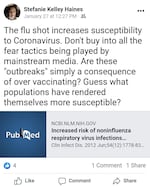Conspiracy theories about the new coronavirus could be more dangerous in rural Oregon, where rumors waste scant resources and undermine trust in public health efforts.
In southeastern Oregon’s Harney County, even a hospital leader has spread misinformation on social media since the coronavirus outbreak began in China.
Stefanie Haines is director of clinical services for Harney District Hospital in Burns. Like many rural health care workers, she plays more than one role in the region's isolated health care system. Haines owns the only fitness center in town, which isn't just a gym. It's also an affiliate of The Wellness Way, a chiropractic company selling pricey lab tests to diagnose all kinds of ailments. The program also markets treatment plans like the "vaccine detox."
On her personal Facebook page, Haines advances conspiracy theories about the debunked dangers of vaccinations, while promoting services available through the fitness center. Through memes, articles and her own words, Haines has vilified immunizations that protect millions of people from communicable diseases like measles, influenza and polio.
Before people in the U.S. started dying from the new COVID-19 disease, for which there is no vaccine, Haines told friends and followers, “the flu shot increases susceptibility to Coronavirus.”

A screenshot from Haines' personal facebook page.
Accessed March 5, 2020, Facebook.com.
She linked to a medical study that discusses weakened immune systems as a result of the flu shot, but does not reference COVID-19.
The same day health officials announced Oregon’s first case, Haines shared a political meme about how “#Cornavirus [sic] helps the Deep State,” yet another online conspiracy theory. And as the virus spread, killing more than a dozen people at a nursing home in Washington state, the Harney County Fitness Center posted an article offering “5 ways to prevent it.”
No. 1 on that list? Get your immune system "properly tested" by buying a lab test from Haines' side business. The labs range from $200 to more than $500, and aren't covered by insurance. The article's No. 2 prevention tip: herbal supplements, with a link to the company's online store.
Haines did not return requests for comment on a list of posts containing debunked or self-dealing information about communicable diseases. After questions posed by OPB, she took to Facebook in defense of her views.
“The items I share are for the purpose of educating, they are based on my opinion and I don’t suggest anybody do anything, without doing their own research first. That said, I do not feel these concepts are crazy or outlandish, they simply align with my personal opinion. Not my employer’s opinion, my business’s, nor necessarily my family’s,” the post stated.
The hospital also declined to answer a list of emailed questions. A spokeswoman sent a statement:
“Harney County Health District neither condones nor agrees with the personal opinions expressed by Stefanie Haines. She is a public employee and is entitled to have and express her own personal beliefs. However, the views expressed by Ms. Haines are her own, and they do not represent Harney County Health District or any of its entities.”

A screenshot of the Harney District Hospital's administration web page.
Accessed March 8, 2020, https://www.harneydh.com/about/administration/
Misinformation, especially coming from a health care professional, is dangerous for a number of reasons, according to Dr. Bob Pfister, the chief officer for safety and quality at St Charles Health System in Bend.
“It creates fear and anxiety, which is painful in and of itself, but when people are confused and reacting to false signals like that, unfortunately it makes them less receptive to the actual good advice,” said Pfister, a neonatologist who reviewed some of Haines’ claims about vaccine dangers and COVID-19.
“Bottom line: There are no reports of influenza vaccination increasing susceptibility to the current coronavirus outbreak (COVID-19),” Pfister wrote in a follow-up email, adding he searched five databases of medical literature for any connection.
"Americans' risk of developing COVID-19 is dwarfed by their risk of getting seasonal influenza," Pfister added, referring to estimates from the U.S. Centers For Disease Control on how many flu cases have been averted through vaccinations.
Last week Facebook CEO Mark Zuckerberg said the platform would remove certain false claims about the new coronavirus, and offer free ad space to the World Health Organization.
"It's important that everyone has a place to share their experiences and talk about the outbreak, but as our community standards make clear, it's not okay to share something that puts people in danger," Zuckerberg wrote in the post.
As the coronavirus has spread throughout the Northwest, politicians have been taking increasingly direct action to address it. Oregon Gov. Kate Brown declared a state of emergency Sunday. And in nearby Washington state, Gov. Jay Inslee said he is considering state mandated restrictions on social interactions.
Related: Oregon Lawmakers Approve $5 Million For Coronavirus Response
Meanwhile, rural health departments such as Harney County’s have been working overtime to reduce the odds of a localized public health crisis.
Harney County public health director Jolene Cawlfield said last week her agency was communicating through local churches, businesses and the hospital (where Haines works) to disseminate the best available information from the CDC and Oregon Health Authority.
“I was on three coronavirus phone calls yesterday for different parts of my job, since I do several jobs,” Cawlfield said.
In her case, that means everything from treating and screening patients with flu-like symptoms, (she is also one of the region’s few primary care providers), to following up on concerns about disinfecting grocery store carts, or figuring out how the health department is going to pay for its own disinfectant since the price has doubled.
“I just now sent out information to our local mortuary about what to do if they're asked to obtain any post-mortem samples, what kind of protective equipment to wear and how to dispose of the human tissue… We've not had any deaths, but I'm trying to be proactive in getting that information out to agencies before anything happens,” Cawlfield said.
Her department lost two positions last year due to budget cuts. With everything on her to do list now, Cawlfield didn't rate misinformation as a huge problem. But rumors have already wasted precious time and resources.
“We had a rumor that Oregon state police officers from this area had been potentially exposed... and that was false information. So, we had to track that down and debunk that myth,” she said. The process, she noted, distracted the county’s emergency manager from his many jobs.
